Milestone anniversaries for long-running franchises can result in some rather interesting side projects, which is something that is definitely true for Super Sentai. Roughly around the time of Sentai's 35th anniversary fans were first introduced to the fanboy antics of Hikōnin Sentai Akibaranger, and now nearly a decade later a different kind of unofficial Sentai has taken shape. The High School Heroes is a tokusatsu mini-drama produced by both Toei and J Storm Inc., starring members of Johnny's JR (an offshoot of prominent but controversial talent agency Johnny & Associates for male idols yet to officially debut) in the leading roles. The series was written by Yuya Takahashi (Kamen Rider Ex-Aid, Zero-One), Toshio Yoshitaka and Masaya Kakehi, the latter of whom also directed alongside Takuro Oikawa and Gen Takezono.
Itsuboshi Academy is a prestigious school that boasts both excellent grades and student conduct, but it also harbours a dark secret. As well as facing the usual troubles of studies, social circles and after school activities, monsters known as Majin lurk Itsuboshi Academy - with a dark force praying upon the malice within students' hearts to create these monsters.
The school's first line of protection is its Defence Club, led by Himitsu Sentai Gorenger fanboy Taisei Manaka. Using the High School Heroes app created by his deceased father, Taisei is somehow able to transform into the costumed hero AkaHero! With the spirit of Akaranger guiding him, Taisei slowly recruits the school's star pitcher Yusuke Taikgawa (AoHero), basketball ace Ryuhei Domon (KiHero), dance director Naoya Moriura (MidoHero) and illustrator Ichika Sakurai (MomoHero) to form the High School Heroes and uncover the secret behind the Majin!
In some ways, The High School Heroes is the Super Sentai series a certain section of the fandom seem to always be clamouring for. While calling the story "more mature" perhaps gives the wrong impression, it is a series skewed at an audience older than Sentai's intended demographic with quite different expectations when it comes to storytelling. The main example of this is the overall format of the show, with its story told over the course of eight 50-minute episodes as opposed to however many 20-minute ones. It's incredible how much difference that extra time makes to each individual episode plot-line, developing them in a way most conventional Super Sentai series could only dream of. Even if you were to break them down into two-part stories of a more typical length, the flow would be very different. But it isn't just the format of The High School Heroes that makes it stand out as a particular unique, it's the genre as well. Super Sentai isn't a stranger to dabbling in different genres to match whatever motif it's going for that given year, but it's never leaned into one quite as much as The High School Heroes does high school drama. Though each episode has the team defeating some Gorenger-inspired monster at the forefront, finding the student behind that monster is always related to the anxieties that stem from both high school life and youth in general. If you were a fan of these elements in something like Kamen Rider Fourze, then you'll definitely get a kick out of this too.
The High School Heroes may not be quite as extreme in its Super Sentai fanaticism as Akibaranger was, but Nobuo Akagi would definitely get along with Taisei Manaka. Brought up on a diet of Himitsu Sentai Gorenger, Taisei lives and breathes his father's favourite show - amassing quite the collection of memorabilia and foreign the High School Defence Club in its honour. Though he can be impulsive and a little thick-headed at times, he genuinely tries to live by the heroic values that Gorenger teaches. Which is naturally something his soon-to-be teammates don't quite understand upon first meeting, each refusing his invite to join the club until they too exhibit those values and activate their own versions of the High School Heroes app. With each of the characters gradually joining the team one by one it allows for each of them to have their own focus episode because the show properly launches into a team dynamic, with each of them coming from a different high school clique and/or having their own unique backstory. When they're finally all brought together it's not only great to see how well they play off of each other, but in some cases also the little personality quirks that have that mirror their Gorenger counterparts as well. Though the show itself may partly be an avenue to showcase some of Johnny's JR's talent, all of the main cast feel like they could go places because they're all brilliant. They can all certainly act, and judging by the end credits they aren't bad at singing and dancing either (speaking of which, make sure to keep the credits rolling on episode three to see Zenkaizer and Kamen Rider Saber get in on the action too).
But of all the backstories of the High School Defence Club, it's the story of Ichika Sakurai that both stands out the most and will hit home the hardest for a lot of people. Through becoming MomoHero, Ichika is liberated, revealing herself as a trans woman to the rest of the team who in turn accept her for being true to herself. We as the audience see how Ichika has been repressed since childhood by those around her (particularly her father), but also get to see her coming out story presented through the tropes of Super Sentai. Taisei initially sees Ichika becoming MomoHero as wrong because he's incapable of viewing Momoranger's equivalent as anything but a cisgender woman. Not only is seeing themselves in Ichika extremely important for many Super Sentai fans, but it's also seeing the franchise tackle subjects that many would wrongly believe Japan outright ignore. Yes it may be in an offshoot spin-off aimed at an older audience, but with veteran tokusatsu writers behind the wheel on this project it isn't unreasonable to think that these kind of stories could find their way into mainline Kamen Rider or Super Sentai one day. Even if The High School Heroes is largely forgotten over time, Ichika's story is one that deserves to be both commended and remembered.
The high school setting also allows for a wide range of characters, many of whom are equally important to the story. Rounding off the Defence Club are also Hana Morimura, an enthusiastic reporter who assists the group in their various investigations, as well as their club advisor Kiyoharu Amari. Taisei's mother Ruriko also plays an important part - helping guide her son as well as offering insight into the relationship he had with his father. Over the course of the series the Defence Club meet numerous other teachers and students, some of whom become recurring characters themselves whereas others simply add to the character of Itsuboshi Academy itself. But of course heroes also need villains to fight against, and the machinations of the school's headmaster Danjuro Sumitomo provide plenty of dark twists and turns even if his motivations are fairly predicated by the genre the show sits in. However there remains something rather chilling about it all, not only in the layers of manipulation the headmaster has sown but also the cult-like behaviour of his entourage and the school's mantra of "Pure, right, beautiful". Though a story told through fantastical means, it's the kind of dark aura you could imagine a school of this calibre having behind closed doors.
Also supporting the Defence Club from the shadows (or rather, Taisei's imagination) is Akaranger himself, who appears to offer words of wisdom in the most hilarious of ways. Whether it's emerging from a closet during meal times or randomly appearing from the bushes, Akaranger's grand entrances never fail to be the show's chief source of amusement (as well as being accompanied by an extremely hummable theme song). But these scenes provide more than just humour, as their key to Taisei not only becoming a better leader and hero but also a better person in general. Taisei is so steeped in his love for Gorenger that he uses it to help rationalise the world around him, as well as his love for both the series and Akaranger being the lasting link between him and his father. It's no coincidence that veteran voice actor Tomozaku Seki plays Taishi Manaka as well as providing the voice for the (permanently suited) Akaranger.
Although the core elements of the series are directly derived from Gorenger, that doesn't stop The High School Heroes from drawing on other aspects of the Super Sentai franchise that came much later - particularly the emergence of a sixth hero. Whereas the introduction of each member of the core team is sufficiently told over the course of one episode each, student council president Hyuma Oura's journey from the Headmaster's lapdog to GinHero is one that's far more drawn out, steeped in all the tropes of a sixth ranger's story. Hyuma's troubled journey takes him from majin to lone wolf hero, eventually coming to accept the rest of the team in the same way that they accepted him. Like the rest of the cast it's a story that works perfectly in the high school setting, focusing particularly on his inferiority complex and need to prove himself as the best.
Though it's a show that unique in many ways once you scratch the surface, at the same time you don't need to look much further than its suit design to see it striving to be something different. Despite the familiar sight of coloured spandex (and a neat little Gorenger nod in their tie stripes matching that of their corresponding Goranger), The High School Heroes integrates a school uniform motif into the costume design to remarkable effect - as well as giving each hero further individuality with their forename initial sculpted onto their visor. From a production standpoint it feels primarily as a way of giving each of these upcoming idols further individuality despite being part of a unit (those same initials are also called out as part of the show's end credits theme), but manages to work within the context of the show as well. Outside of costume each of the heroes wears their school uniform slightly differently to reflect their personality, and while that's lost in costume the visors provide something that's distinctly "them" in a similar way. Meanwhile the villain side of things take far more direct inspiration from Gorenger, with each Majin that appears a more twisted, modern take on the various soldiers of the Black Cross Army. This is one area where the show does show some more mature leanings, with the wonderfully silly Baseball Mask reimagined to particularly grotesque effect.
The High School Heroes could have been many things - a forgettable Super Sentai side-project, a means to spotlight a bunch of up-and-coming idols or just another way to market the franchise's milestone anniversary to a wider market. But instead the show is one of the most interesting Super Sentai projects to come out in years, and though not strictly billed as an anniversary venture is just about the perfect way to celebrate it. Embodying the spirit of Himitsu Sentai Gorenger and beyond, The High School Heroes is a unique take on the Super Sentai story through the lens of a high school drama. Impressively tackling a range of subjects through more serialised story telling, it is quite unlike any Sentai series you'll have seen before and all the stronger for it. Just how well remembered it'll be over time is anyone's guess, but right now definitely more people should be talking about it.


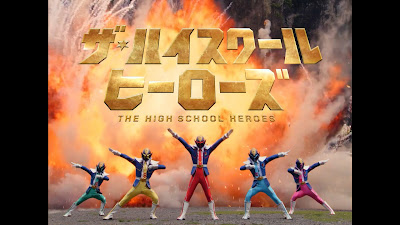
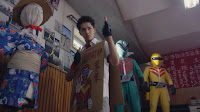
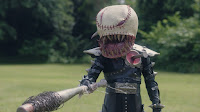
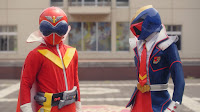
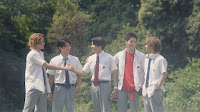

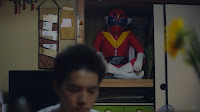

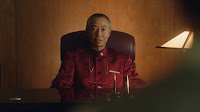


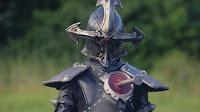
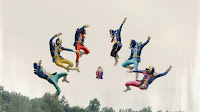

1 comment:
I mentioned briefly on Super Hero Senki post (as Anonymous), how 2021 was disappointing and underwhelming year for tokusatsu (as least IMO); when this show came out in July, I didn't care about Zenkaiger too much, Kamen Rider Saber (technically 2020 series) was terribly despising, and Ultraman Trigger didn't click on me very well as Tiga remake or standalone series (probably one of the weakest entry in New Generation Series); so my overall expectation for series was pretty low. The only show I was really invested at the time was Power Rangers Dino Fury, which was surprisingly a strong entry for Hasbro era.
I was very surprised that Johnny & Associates, was involved heavily in production, despite their controversial reputation, so that made me curious a little and got attention.
As it turns out, I really enjoyed more than I expected.
It pays tribute and respect to Sentai (particularly Goranger, the first Sentai), lot better than some of other anniversary series and crossover special/movies.
It's been a while since we've seen high school themed Sentai (parody) show, which we haven't seen since all the way back in Megaranger (1997) and even for Rider with Fourze (2012), it's been almost decade.
I really like how each of rangers/high school students, has their own issues and story arc, which worked out very well and developed; I especially enjoyed Sakurai (Momo) episode, regarding male pink ranger (which has yet to happen... until upcoming series, DonBrothers with FIRST official male pink).
Overall, I really enjoyed the series, that exceeded my expectation.
The only gripe I had is that I wished it has second season (Fall~Winter) to see rangers graduate, but the series itself was good enough as parody show and tokusatsu in general.
Regardless of my feeling for Johnny industry and their controversy, the show is and important chapter to history and it's a good pairing with other parody show, such as Akibaranger. I hope someday, they appear in one of Sentai crossover/anniversary movie or special, just like Akibaranger in Super Hero Senki.
It's definitely best tokusatsu show of 2021 IMO.
Post a Comment